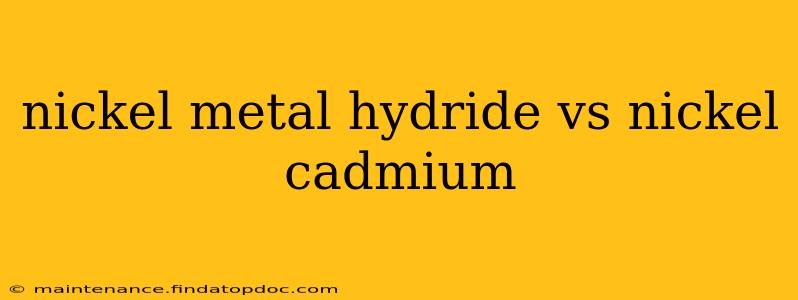Choosing the right rechargeable battery can be tricky, especially with so many options available. Two prominent contenders in the rechargeable battery arena are Nickel Metal Hydride (NiMH) and Nickel Cadmium (NiCd). While both offer rechargeable capabilities, they differ significantly in performance, environmental impact, and overall suitability for various applications. This detailed comparison will help you understand the key distinctions and choose the best battery for your needs.
What is a Nickel Metal Hydride (NiMH) Battery?
NiMH batteries are a significant advancement over NiCd technology. They utilize a negative electrode made of a hydrogen-absorbing alloy and a positive electrode made of nickel hydroxide. These batteries boast a higher energy density than NiCd, meaning they can store more energy in the same physical size. This translates to longer run times for devices powered by them. Furthermore, NiMH batteries exhibit a lower self-discharge rate, meaning they retain their charge better over time when not in use.
What is a Nickel Cadmium (NiCd) Battery?
NiCd batteries, while older technology, were once a dominant force in the rechargeable battery market. They employ a negative electrode made of cadmium and a positive electrode of nickel hydroxide. While robust and able to withstand many charge-discharge cycles, NiCd batteries have significant drawbacks compared to NiMH, as we'll explore below.
NiMH vs. NiCd: Key Differences
Let's delve into a detailed comparison of NiMH and NiCd batteries across several key aspects:
Energy Density:
- NiMH: Higher energy density. They pack more power into the same size, offering longer operating times.
- NiCd: Lower energy density. They provide less run time compared to NiMH for a given size.
Memory Effect:
- NiMH: Minimal memory effect. While some slight memory effect may exist in older NiMH designs, it's largely negligible in modern batteries. You can recharge them at any point without significantly impacting their capacity.
- NiCd: Pronounced memory effect. Repeatedly recharging a partially depleted NiCd battery can lead to a reduction in its overall capacity. This is why fully discharging NiCd batteries before recharging was (and still is to some degree) recommended.
Self-Discharge Rate:
- NiMH: Lower self-discharge rate. They retain their charge for a longer duration compared to NiCd batteries when not in use.
- NiCd: Higher self-discharge rate. They lose charge faster over time when not actively used.
Environmental Impact:
- NiMH: More environmentally friendly. They do not contain cadmium, a toxic heavy metal. However, some NiMH batteries may use other materials that require careful recycling.
- NiCd: Harmful to the environment. Cadmium is highly toxic and can contaminate soil and water if improperly disposed of.
Cost:
- NiMH: Generally more expensive initially.
- NiCd: Usually less expensive upfront, but the long-term cost may be higher due to their shorter lifespan and higher self-discharge rate.
Lifespan:
- NiMH: Generally have a shorter lifespan (number of charge-discharge cycles) compared to NiCd batteries. However, the improvement in their technology is bridging this gap.
- NiCd: Typically exhibit a longer lifespan than NiMH batteries.
Charging Time:
- NiMH: Charging times vary depending on the charger and battery capacity, but generally comparable to NiCd.
- NiCd: Charging times generally comparable to NiMH.
Operating Temperature:
- NiMH: Performance can be affected at extreme temperatures, similar to NiCd.
- NiCd: Performance can be affected at extreme temperatures, similar to NiMH.
Which Battery is Right for You?
The best choice between NiMH and NiCd depends heavily on your specific needs and priorities.
-
Choose NiMH if: Environmental friendliness is a concern, you need longer run times, and a minimal memory effect is important. These are generally better for most modern applications.
-
Choose NiCd if: You require a battery with an extremely long lifespan and cost is the primary concern. These are becoming increasingly rare in consumer applications.
This detailed comparison should help you make an informed decision when choosing between NiMH and NiCd rechargeable batteries. Remember to always dispose of batteries responsibly to minimize environmental impact.
